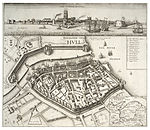Wilberforce House
Biographical museums in the East Riding of YorkshireEnglish organisation stubsGrade I listed buildings in the East Riding of YorkshireGrade I listed housesHistoric house museums in the East Riding of Yorkshire ... and 5 more
Historic houses in Kingston upon HullMuseums in Kingston upon HullSlavery museumsUnited Kingdom museum stubsUse British English from August 2015

Wilberforce House is a British historic house museum, part of the Museums Quarter of Kingston-upon-Hull. It is the birthplace of social reformer William Wilberforce (1759–1833), who used his time as a member of Parliament to work for the abolition of slavery throughout the British Empire. Like the nearby Blaydes House and Maister House, also on the High Street, the Grade I listed building was formerly a merchant's house with access to quayside on the River Hull.
Excerpt from the Wikipedia article Wilberforce House (License: CC BY-SA 3.0, Authors, Images).Wilberforce House
High Street, Hull Old Town
Geographical coordinates (GPS) Address Phone number Website Nearby Places Show on map
Geographical coordinates (GPS)
| Latitude | Longitude |
|---|---|
| N 53.744461 ° | E -0.330073 ° |
Address
Wilberforce House Museum
High Street 23-25
HU1 1NQ Hull, Old Town
England, United Kingdom
Open on Google Maps







